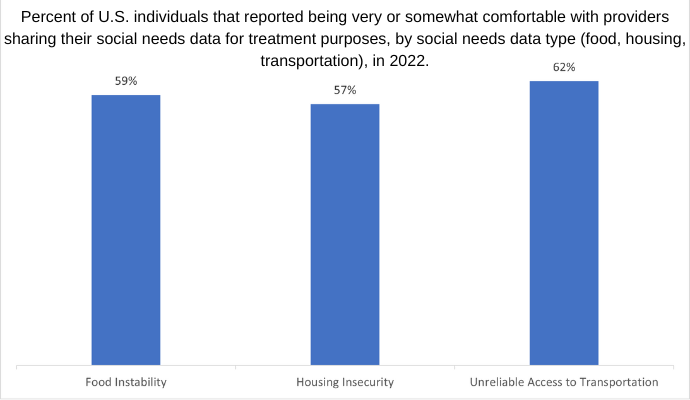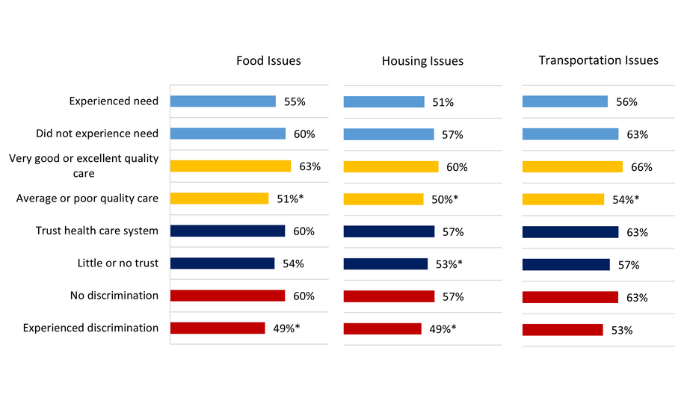Better Patient Experience Needed for Trust in SDOH Data Sharing

Original Article by ehrintelligence.com
Posted on October 31st, 2023 by Sara Heath
Patient experience factors, like care quality and healthcare discrimination, make it harder for patients to trust SDOH data sharing, ONC said.
– Healthcare professionals need to determine what it’ll take for patients to trust the exchange of their social determinants of health (SDOH) data, including looking into improving patient experiences and clearing up privacy and security concerns, according to the Office of the National Coordinator for Health IT (ONC).
In a recent Health IT Buzz blog post, agency officials Catherine Strawley and Chelsea Richwine examined data indicating that patients aren’t always receptive to SDOH data sharing.
This comes as healthcare organizations continue to set up SDOH screening strategies. Using either paper-based or digital surveying, patients report to organizations the social factors impacting them and their well-being.
Vaultara allows for rapid, contact-less access to essential imaging data and improved efficiency.
Plus a reduction in operational costs associated with medical image sharing.
Most patients are open to this kind of screening, Strawley and Richwine wrote in the blog post, pointing to data from the University of California, San Francisco, stating as much.
Separate studies have found that patients, especially younger patients, actually want their providers to conduct SDOH screening and that they want their providers to initiate conversations about SDOH.
But patients are a little more reticent to sign off on their providers sharing SDOH data with other healthcare professionals or even social services providers, Strawley and Richwine wrote. Citing analysis of the Health Information National Trends Survey data from 2022, the pair said that four in 10 American patients were wary of their provider sharing their SDOH data. Six in 10 were comfortable with SDOH data sharing.
Broken down by common social determinants of health category, 59 percent were comfortable with sharing food instability information, 57 percent were comfortable with their providers sharing housing insecurity data, and 62 percent were comfortable with the sharing of transportation access information.

Source: Office of the National Coordinator for Health IT
View a demo of Vaultara's self-hosted image sharing software, Flight.
One of the main sticking points for patients with the notion of providers whom they do not know having information about their social needs, Strawley and Richwine wrote.
“They also expressed concerns that this information related to care has been historically stigmatized and could fuel stigma-driven discrimination,” the pair added. “Some participants also indicated a lack of trust that their needs could be adequately addressed by their providers because they felt that addressing these needs did not fall within their providers’ scope of work.”
Patient discomfort with SDOH data sharing often depended on previous patient experiences, Strawley and Richwine pointed out.
“Our findings suggest that patient experiences with the healthcare system may influence individuals’ comfort with social needs data sharing between providers for their treatment purposes,” they wrote in the blog post. “This has important implications for providers’ ability to address social needs through a patient-centered approach, as sharing information with other providers or social services organizations is often required to connect patients to the resources or services they need.”
Generally, having better care quality, more trust in the healthcare system, and having no experiences of healthcare discrimination led patients to trust SDOH data sharing. Conversely, patients who experienced poor outcomes, who had little trust in the healthcare system, and who experienced healthcare discrimination were less likely to trust SDOH data sharing.

Source: Office of the National Coordinator for Health IT
In particular, experiencing poor healthcare quality and healthcare discrimination significantly decreased patient trust in SDOH data sharing, the data showed.
“As discussions around patient consent continue among academics and policy-making organizations, there may be opportunities for health systems and providers to address patient discomfort with data sharing by addressing well-documented, underlying issues in health care (i.e., poor quality of care, trust in providers or the healthcare system, discrimination) that may contribute to individuals’ discomfort with information sharing,” Strawley and Richwine recommended.
Moreover, it may be fruitful to examine the privacy and security provisions that protect SDOH data. This includes disclosing to patients how providers and social services will use SDOH data that is shared with them, plus making sure there are actually resources in place to address the SDOH that an individual experiences.

